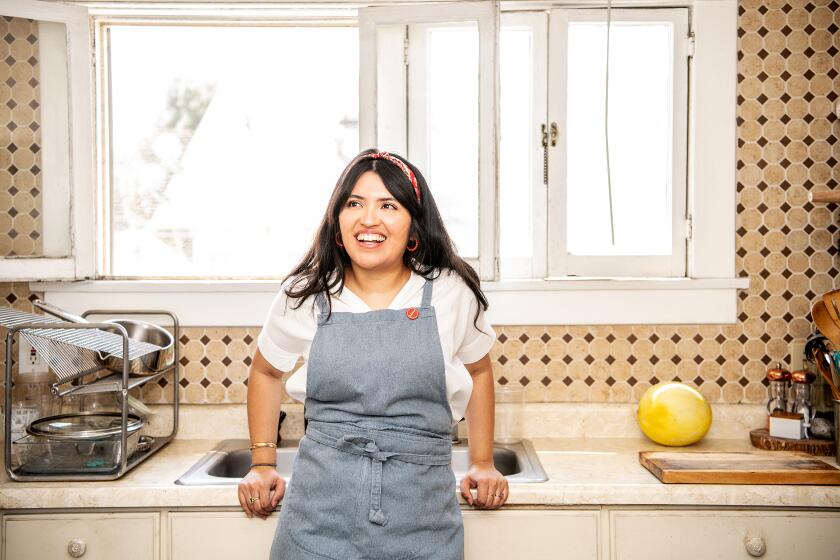Is it pulp fiction or juicy fact?
- Share via
THE best orange juice I’ve had has always seemed to come from a juice press. It’s the flavor of high summer, like the essence of some supernal giant berry that just happens to have orange-colored juice, with a hint of aromatic oils from the peel to make it clear that this is a citrus fruit after all.
All around town, at restaurants and bars such as the Hungry Cat in Hollywood, you see them squeezing oranges by hauling down on the big lever of a juice press. And not by sticking them into a buzzing electric juicer.
I’ve wondered whether it had to do with the way the two methods work; one presses the orange, the other reams it out with a rotating cone. Could all that reaming be scraping off bad stuff from the notoriously bitter peel?
This is the very time of year when you’d want to know, because we’re right in the prime season for California-grown Valencia oranges. So I went out and bought a big, muscle-bound citrus press, eight gleaming pounds of solid aluminum built to outlast human civilization.
Then I got some Valencias and juiced a couple on both this Amazing Hulk of a press and on a standard electric juicer. Everybody who tasted it agreed that the Hulk’s juice was definitely sweeter, even more aromatic and flavorful, it seemed. I repeated the experiment twice and got the same result in blind tastings. I even juiced some navel oranges, though they aren’t known for great juice, and still the juice from the press was sweeter.
What could explain this? The juicing method, right?
I asked researcher Renee Goodrich of the University of Florida, an expert in the science of orange juice. She cast cold water on this theory, suggesting that flavor would be more affected by “the types of oranges people used, the general care and sanitation that was used in the kitchen, as well as how long people kept the juice around after squeezing.”
OK, there was an expert’s opinion. I couldn’t say I was keen on that crack about our kitchen, though.
Next I contacted Paul Breslin, a specialist in taste perception at the Monell Chemical Senses Center in Philadelphia, and asked him whether scraped-off bits of bitter peel might make juice taste less sweet. “It is certainly possible,” he allowed. But he thought this explanation would be more likely if a large quantity of sugar was necessary to make two samples of orange juice taste equally sweet.
Food science writer Harold McGee pointed out that oranges aren’t equally sweet all the way through. Blossom end juice can be more than 12% sugar while the stem end is only 8%, definitely on the sour side.
That I could certainly look into. All you need to find the sugar content of fruit juice is a little gadget called a refractometer, which looks like a microscope eyepiece stuck into a clarinet mouthpiece. You put some juice on the clarinet end and peep through the other. Like magic, a line on a scale tells you the percentage of the solution that’s sugar (this is the measurement winemakers are always referring to as “degrees brix”).
So the next day I brought in eight more pounds of Valencias to the Test Kitchen. To correct for the greater sweetness of the blossom ends, I took pairs of oranges and cut them in half, then switched them, juicing the blossom end of one together with the stem end of the other.
Bam, bam, bam, bam, bam -- I juiced five pairs of oranges and tested the juice with a refractometer. And in every case, the sugar reading was 1.5 to 2 percentage points higher in the juice from the press. The following day, though, I wasn’t able to replicate this clear-cut pattern.
It’s obvious to anybody who’s made orange juice that oranges vary considerably in sweetness. I suppose my earlier tests might -- through a weird run of luck -- have been skewed by an extreme difference in sweetness between one end and another in one out of every pair of oranges, and that difference always happened to favor the juice press.
So what does this mean for the great contest between press and ream? The press seems to extract a little more juice and, as you’d expect, less pulp than the electric juicer. And though the natural variability of oranges certainly plays a role in sweetness and flavor, using a press seems to increase the odds of getting the best juice possible out them.
We don’t know why, and science can’t seem to explain it, but the juice out of a press just tastes better.
And the proof is in the taste. So no matter what the experts say or don’t say, I’m sticking with my Amazing Hulk of a juicer. In the final orange juice equipment smackdown, I want to have it in my corner.
More to Read
Eat your way across L.A.
Get our weekly Tasting Notes newsletter for reviews, news and more.
You may occasionally receive promotional content from the Los Angeles Times.










